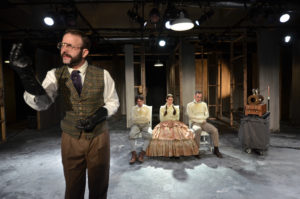“Honesty. That’s the thing in the theater today. Honesty … and just as soon as I can learn to fake that, I’ll have it made.”
— Anonymous
Grab the speedometer and move it, the car does not speed up. Mock up an airport, planes will not come. We are conditioned to causality and that the mere appearance or measure of a thing is not (usually) a handle into the thing itself. We smile when happy, cry when sad, and believe that we can tell when emotions are genuine or contrived. It comes as some surprise that this may not be entirely true. There is evidence that outward expressions, real or fake, may drive physiological processes instead of merely being driven by them. This two-way street is at once interesting and lucrative. Demagogues and marketeers profit by inventing stimuli to induce specific responses. A big part of culture and its preservation is in the transmitting feelings and emotions through performance. Authenticity – whatever its definition – is considered essential.

Click image to enlarge: G.-B. Duchenne de Boulogne, Synoptic plate 4 from Le Mécanisme de la Physionomie Humaine. 1862 – Wikimedia Commons: Public Domain
Playwright David Bridel takes on the latter in ‘Lunatics and Actors’ mounted through the end of May by The Four Clowns at Shakespeare Center LA. Scientist Guillaume Duchenne de Boulogne (Thaddeus Shafer) asserts that he can evoke performances from his trio of patient/inmates (Tyler Bremer, Andrew Eldredge, and Alexis Jones) that surpass in intensity and authenticity those by conventionally trained actors. His electrochemical method will find gleeful interest from results-oriented directors tired of having Stanislavski flung back at them. The intriguing premise draws from nineteenth century events. The historical Duchenne performed early research in connecting human physiological and physiognomical reactions to electrical stimuli. He applied shocks to patients, photographed their faces, and in time could evoke specific expressions from them at will. Much of this work would be frowned upon today for ethical reasons but it came with other results in different areas that persist. Duchenne laid the foundations for modern neuroscience. The bidirectionality of emotion has since been intensively and controversially studied by Ekman, Zajonc, and others.

(standing) Thaddeus Shafer as DR. DUCHENNE (seated from left to right) Tyler Bremer as BON-BON, Alexis Jones as FIFI, and Andrew Eldredge as PEPE. Photo courtesy of Andrew Eiden
The setup requires actors in the audience to volunteer for light onstage duty. This being Los Angeles, it isn’t a problem. Duchenne runs through an interview followed by exercises and a compare/contrast. Meisner, Linklater, and Alexander may help the aspiring actor but a healthy zap from the glowing Volta pile invokes a style of its own. The inmate trio, all experienced clowns, win the intensity fight in a walk. Director Jeremy Aluma has to take his time churning the cream and the laughs hide a somewhat lengthy introduction. It snaps into butter when the contest shifts to ‘Hamlet’ and its endless opportunities to test authenticity (or anything else of interest to artists). Convention holds its own for subtlety but not for pain, fear, or terror. A change from funny to harrowing occurs in a tight, disturbing vignette to rival ‘Clockwork Orange’ or ‘1984’. A final distillation of ‘Hamlet’ to a delicate touch of ‘Pagliacci’ is a marvel. Focussing on the terrifying, it is entirely different from the troupe’s recent reimagining. Give substantial credit to the large design team. Their coherent efforts drive a fanciful story which might fall flat in less skilled hands. The Clowns don’t skimp on production and one wonders how they balance the books against a batguano-crazy $15 ticket price.
There are inside jokes aplenty within the world of the play. Theatre in Los Angeles is considered the domain of the insane. Are the three inmates victims of an unscrupulous workshop-monger? Bridel is the incoming Dean of Theatre at USC. Does this foreshadow his plans for the school? Perhaps only artists can or will get the full scope of it. But, the promise and threat of machines has been a staple of storytelling from ‘Frankenstein’ to ‘Blade Runner’ and beyond. Can we controlled by electrodes? Yes but we’re attached enough to our screens to make such a physical connection unnecessary. A more unnerving question is what form the next evolutionary step will take once we or our algorithms figure out what makes us tick. The reductionist approach claims that once we find the root of the structure that everything will follow. Others argue for multiple processes that compete with and against one another in a sort-of roshambo. Either way, the tacit assumption is that machines would then emulate us, only much much faster. Why stop there? The Melancholy Dane may have been overly optimistic about the Godlikedness of man – we are most likely just another step along the path. That’s what make these clowns the ones of nightmares. Go see them but leave the kids at home.
Four Clowns presents
Lunatics & Actors
by David Bridel
directed by Jeremy Aluma
A WORLD PREMIERE
April 29 – May 28, 2016
at The Shakespeare Center of Los Angeles
1238 W 1st Street
Los Angeles, CA 90026
Performances start at 8pm
Street parking in the neighborhood
Stage Manager Ashley Jo Navarro
Assistant Director Amaka Izuchi
Set Designer Fred Kinney
Lighting Designer Azra King-Abadi
Costume Designer Elena Flores
Sound Designer Kate Fechtig
Propsmaster Niki Mercs
Technical Director Matt MacCready
Producers Jeremy Aluma and David Anthony Anis
Associate Producers Jennifer Carroll and Julianna Stephanie Ojeda